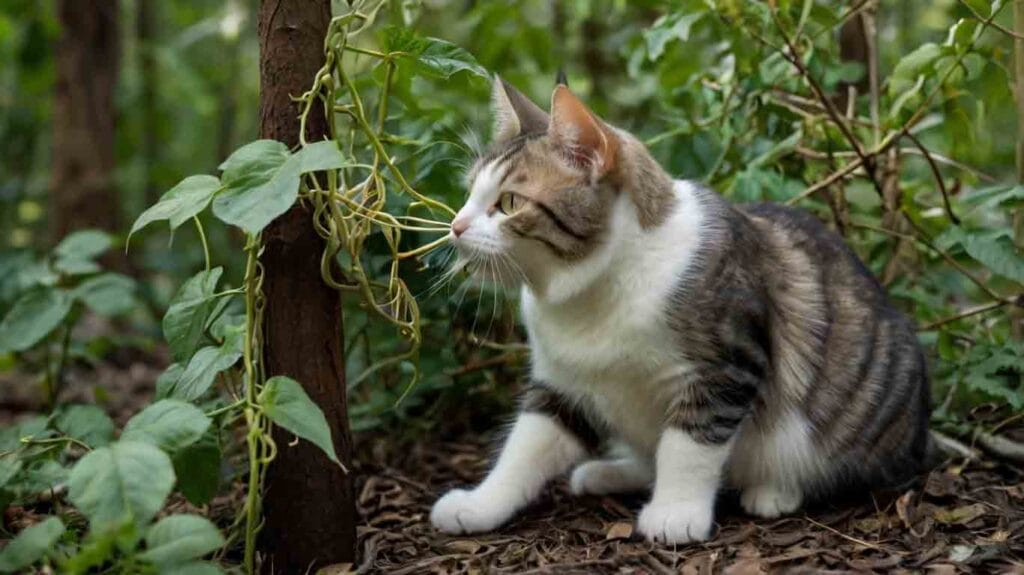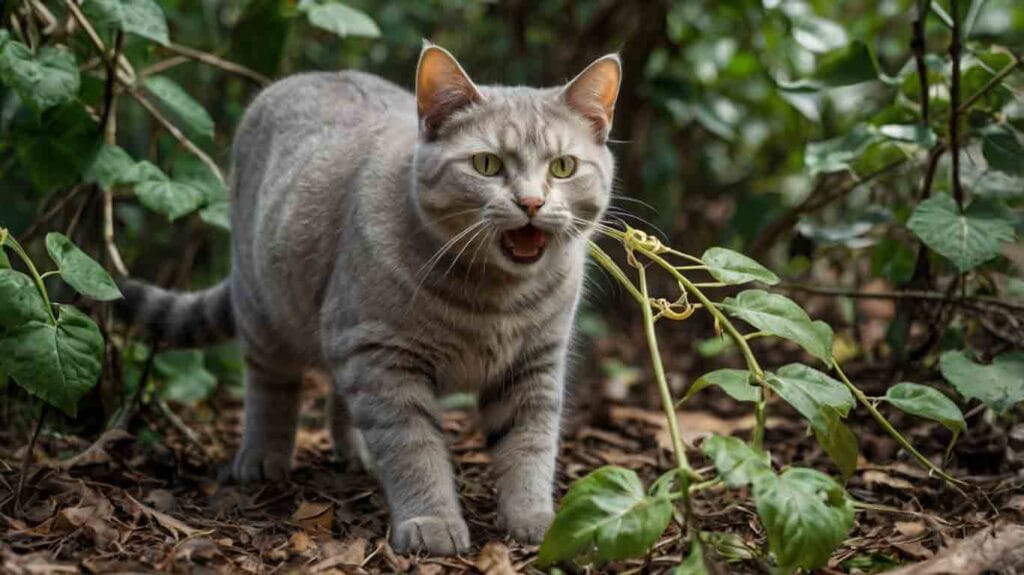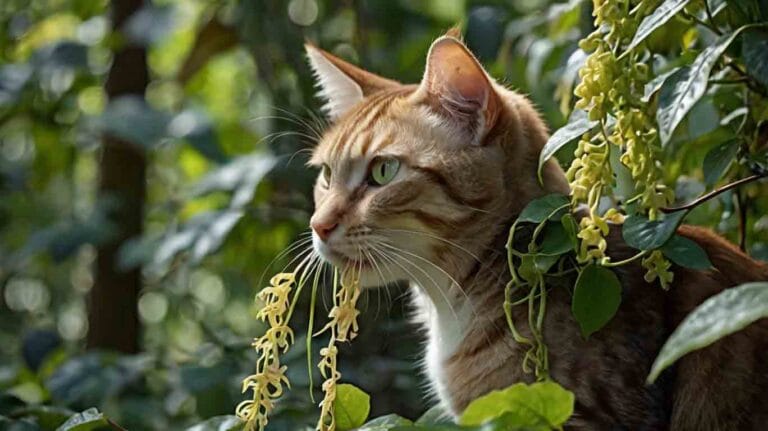Cat owners want to first and foremost protect their cat’s wellness and joy. Using silver vine plants offers an underused solution to create a stimulating environment for your cat that acts differently than traditional catnip.
But is Silver Vine safe for cats? This article investigates what Silver Vine offers your cat and proves its safety to guide your selection process.
What is Silver Vine?
Silver vine (scientific name: Actinidia polygama) is a perennial vine that originates from the multiplexes in Asia.
It has been used for hundreds of years in traditional medicine and also as a stimulant for cats.
The plant also called “matatabi” in Japanese, translates to “travel again,” a nickname due in part to the vigorous and playful behaviour it seems to inspire in cats.
How to Offer Silver Vine to Cats Silvervine is sold in the form of powder, sticks, and leafy mixtures.
Powder is often the strongest and most potent, while sticks and leafy mixtures offer more mild yet effective stimulation.
This accessibility allows you to easily incorporate Silver Vine into your cat routine.
What Active Compounds in Silver Vine?
Unlike catnip, which has one active constituent, nepetalactone, silver vine has a broad range of bioactive compounds. These compounds are actinidine, iridomyrmecin, isodihydronepetalactone and its isomers, as well as a small amount of nepetalactone.
Together, these compounds stimulate sensory neurones in the nasal tissue of a cat which then activate the olfactory bulb and other brain regions responsible for the behavioural phenotype response.
The mechanism of action is rather interesting; upon inhalation by a cat, these compounds facilitate a quick hyperreaction that is both rapid and severe.
The reason is that the silver vine’s active components bind to the vomeronasal organ (sometimes referred to as Jacobson’s organ), which is a specialised sensory structure in many animals, including cats.
Effects of Silver Vine on Cats
The Importance of Silver Vine. Unwrapping the Potential of Silvervine for Cats The Best Silver Vine for Cats When cats are exposed to silver vine, their behaviours display a wide spectrum, all of which are both humorous to observe and also indicative of the heightened, almost euphoric levels of thrill they experience in their state of arousal.
These reactions usually start right away after being exposed and can last around 30 minutes. Some behaviours are rolling on the floor, meowing, drooling, staring into space, and generally being more playful.

In Japan, this is called the matatabi dance and refers to how cats react specifically to silver vine.
The age of the cat plays a role, as older cats appear to have a stronger reaction than younger cats, and the variety of silver vines may also determine the strength of the response.
For example, silver vine sticks would generally stimulate a less intense reaction compared to powdered silver vine.
Benefits of Using Silver Vine for Cats
Silver Vine provides a host of benefits that make it a perfect companion to your cat’s enrichment schedule.
Environmental Enrichment
The boredom and stress can be severe, particularly for indoor cats, who do not have the level of stimulation provided by a natural environment.
Silvervine serves as an olfactory enrichment which can dramatically enhance their environment, thereby minimising behavioural problems and potential health issues (i.e. urinary problems and obesity).
Exercise and Weight Management
Silvervine is a natural stimulant that encourages cats to be active, giving them bursts of energy that help them lose weight.
It aids in keeping a healthy weight and overall fitness by encouraging physical activity.
Stress Relief and Anxiety Reduction
Silvervine has a strong euphoric effect that has a good calming and relieving effect on stressed out cats.
This is especially helpful for cats who are stressed or anxious and can contribute to a more peaceful and soothing environment.
Dental Health Benefits
Cat chew sticks, for example, made of silver vine, can encourage dental health by also breaking down and removing plaque and tartar on the teeth prepending their removal.
An added advantage that makes silver vine a great accessory to feline dental health.
Attracting Cats to New Environments
Silvervine is a laureate and simply attractive to them. Fill the new areas with silver vine powder or sticks to get your feline to explore their new areas.
Also read: How to Stop Your Cat from Overgrooming? 7 Top Vet Advice
Safety Profile Of Silver Vine
The most important concern for any cat owner is whether Silver Vine is safe for their cats.
The good news, according to both the veterinary community and research studies, is that silver vine is extremely safe for cats.
Toxicity and other side effects
There are no known toxicity or adverse reactions reported because of the use of silver vine in cats.
Silvervine has been confirmed non toxic to cats, according to the Pet Poison Helpline and the Animal Poison Control Centre.
Watch for Triggers
Silvervine is safe on its own, but you should always supervise your cat when offering new chews or toys, just in case any hazards are present.
Small shards of silver vine sticks can splinter off, posing a choking hazard or risk of intestinal blockage if swallowed.
As such, you want to supervise your cat closely and throw away any bits that may break off.
Can Cats Be Addicted to Silver Vine?
Cats can become addicted to euphoric substances, such as silver vine, is a common misconception. Well, it turns out, this is not the case.
Understanding Addiction vs. Natural Endorphin Release
Silvervine activates the release of natural endorphins in felines that excite the opioid system without the risk of addiction.

This is much different than outside drugs such as morphine, which can lead to dependence and addiction. Since it triggers an endorphin release, cats do not become addicted to the silver vine.
Lack of Evidence for Addiction
Studies have found no evidence that cats climb addicted to silver vine. So the risks are minimal, and the benefits, when used appropriately, outweigh the risks.
Also read: Is Guar Gum Bad for Cats? 7 Vet Tips on Safety and Risks
Special Considerations for Different Cat Groups
There are minimal special considerations for healthy adult cats, although the author suggests keeping cats monitored in smaller groups (over 4-6 cats) when first offered silver Vine, as too much excitement can lead to fighting or something as preventable as a fight caused by one cat blocking another from accessing silver vine.
Kittens and Silver Vine
Some kittens under the age of 8 months do not respond to silver vinegar, or they have a lesser response.
Young cats have an undeveloped vomeronasal organ, which would explain this behaviour. Silver vine can also be introduced once your kitten reaches a certain age.
Pregnant or Nursing Cats
For pregnant or nursing cats, there’s also the possibility of a blunt reaction to silver vine, but little is known as to why.
As with anything else, you should consult your veterinarian before adding new substances to your cat’s environment, especially if they are pregnant or nursing.
The Response of Older Cats
Unlike younger cats, older cats responded more strongly to Silver Vine.
This makes Silver Vine a great option to enrich the life of an older cat, who may require more stimulation to remain active and engaged.
Also read: Is Lemon Balm Safe for Cats? 7 Vet’s Perspective & FAQs
How to Use Silver Vine Safely
In order to have your kitty take advantage of Silver Vine while keeping difficulty at bay, here are some areas of focus for safe use.
Proper Administration
Silver vine can be given in different forms (powder, sticks, leafy mixtures, etc.). Refer to the packaging for the recommended amount to use.
A dose of about a quarter teaspoon of silver vine powder is usually enough to create an effect.
Where to Use Silver Vine
You can sprinkle silver vine powder on the floor, in your cat’s bed, or on their new scratch post. This encourages playful behaviours and exercise, making new environments more enticing for your cat.
Veterinary Guidance and Advice
If your cat has any health issues or is on any medications, always discuss Silver Vine with your veterinarian prior to adding it to their routine.
Your own veterinarian can make the best recommendations and such based on your own kitty’s needs.
wrap up on Is Silver Vine Safe for Cats?
Silvervine serves as a safe and effective means by which to enrich your cat’s environment, yielding benefits ranging from exercise and natural stress relief to dental health and attraction to a novel environment.
Do cats react positively to silver vine? Silvervine is a feline entheogen you’ll find in nature that comes with many therapeutic values.
As always, supervise your cat when introducing new chews or toys and use them according to the guidelines provided. Silver Vine helps ensure your cat is happy, healthy, and entertained.
Also read: Can Cats Eat Blueberries? a complete guide Fot Cats
FAQ: Is Silver Vine Safe for Cats?
Q1: can cats have too much silvervine?
Ans: Cats need minimal silvervine to experience effects and generally do not overdose. However, prolonged exposure to this material may trigger digestive discomfort or unwanted excitement. Limit usage to a few times weekly for safety.
Q2: is silvervine stronger than catnip?
Ans: Silvervine attracts cats more powerfully than catnip does because it has actinidine and dihydroactinidiolide in it. Silvervine attracts many cats including those who ignore catnip so pet owners often choose it.
Q3: side effects of silvervine for cats?
Ans: Cats find Silvervine safe but eating too much of it can lead to stomach discomfort or digestive problems. Watch how your cat responds and use it sparingly.
Q4: what does silvervine do to cats?
Ans: A plant similar to catnip, stimulates cats by causing excitement, rolling, purring, and playful behaviour. It contains actinidine, which appeals to many cats, providing an engaging, stimulating experience that promotes physical activity and mental stimulation.
Q5: is silvervine safe for cat’s teeth?
Ans: Silvervine is generally safe for cats’ teeth. It encourages chewing, which can help with dental health, but always supervise to avoid potential choking hazards.
